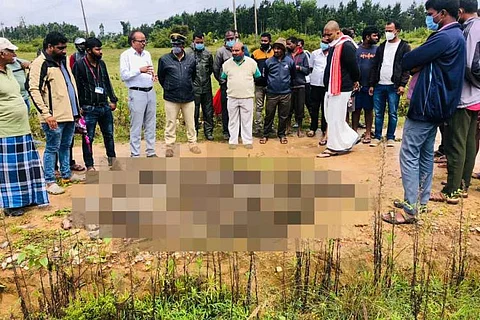

Five days after 38 monkeys were found dead in a gunny bag in Hassan district of Karnataka, the forest and police officials nabbed seven men in the case on Monday, August 2. On July 29, the 38 Bonnet Macaques monkeys, a species prevalent in south India, were poisoned to death and found stuffed in a gunny bag at a road junction at Belur taluk in Hassan district. One monkey managed to escape and was spotted sitting near the gunny bag. The incident shocked many people, including the Karnataka High Court, which registered a suo motu case. While the Belur police caught five persons, the forest officials nabbed two persons. A report in the Times of India stated that police have booked the accused under Section 429 (punishment for committing mischief by killing) of the Indian Penal Code and Prevention of Cruelty to Animals Act.
Of the seven persons nabbed, two have been arrested and produced before the jurisdictional court. The other accused persons are in the custody of the forest officials. One of the culprits reportedly told the police that they pooled money to hire a contractor to catch the monkeys and allegedly shift them to another location. The contract amount finalised for the monkeys’ capture was about Rs 40,000.
The autopsy had revealed that the Bonnet Macaques were poisoned. Veterinarians also found that some of the Bonnet Macaques died due to suffocation since all of them were stuffed in one bag.
Speaking to The News Minute on Monday, Hassan Deputy Conservator of Forests Basavaraj said that villagers of Ugane near Salagame hobli of Hassan taluk were allegedly fed up with the monkey menace that they mobilised funds and roped in two money catchers — Yashodha and Ramu — both residents of Banavara in Arasikere taluk of Hassan, to relocate monkeys out of the village. The report in Times of India also stated that the Yashodha and Ramu were named as prime accused in the case while residents of Ugane village have also been booked.
As per preliminary investigations, the accused told the investigators that Ugane villagers collected amounts ranging from Rs 2,500 to Rs 4,500 to get the monkey catchers. The monkeys were caught in the plantation belonging to Prasanna at Ugane village.
The accused persons hunted the monkeys lasted for two days. After the monkeys were caught, Basavaraj said all of them were stuffed in a tailor-made jute bag, transported in a vehicle and dumped at a road junction near Chowdenahalli. Villagers reportedly chose Chowdenahalli as they found the location “ideal” for the monkeys to settle in a new habitat.
The DCF Basavaraj said samples such as monkeys’ bones, the location where the bodies were found, the vehicle used to transport monkeys, among others, have been collected and sent to Forensic Science Laboratory (FSL) to determine the cause of the deaths.
Investigations are underway, said the DCF.
However, a member of Akhila Karnataka Prani Daya Sangha (animal welfare association), Raghu Sakleshpura, who along with other members were present at the spot when monkeys’ carcasses were found at Chowdenahalli, suspected that the accused persons might have tried to mislead the investigations through their statements that they were trying to “relocate” the Bonnet Macaques.
“It is a clear case of poisoning. Going by the jute bag, I suspect that Boney Monkeys have been killed and dumped inside the bag one after that other. Besides, injuries on their bodies indicate that they were beaten,” said Raghu. The animal rights activist demanded a criminal case be filed against the accused persons and wanted a detailed probe into the killings.
Girisha is a freelancer who writes on wildlife and forests